Key Takeaways: What Tadej Pogačar’s GP Montréal Win Tells Us About the World Championships
Breaking down why Tadej Pogačar's dominant ride signals that he is likely on the cusp of a coveted Triple Crown
Over the weekend, Tadej Pogačar destroyed all-comers on the tough city circuit in Montréal. Despite his UAE team telegraphing his eventual race-winning attack, which finally came with 24 kilometers remaining, his rivals could only sit back and helplessly watch as his devastating acceleration allowed him to ride to yet another solo victory in a top-level one-day race. Outside of adding a second GP Montréal title to his ever-growing palmares, the major implication of the ride was that it foreshadowed a nearly-unstoppable Pogačar taking to the start line at the upcoming World Championships, which will take place on a similarly difficult circuit in Zurich at the end of the month.
Grand Prix Cycliste de Montréal Top Ten
1) Tadej Pogačar (UAE Team Emirates) +0
2) Pello Bilbao (Bahrain-Victorious) +24
3) Julian Alaphilippe (Soudal Quick-Step) +40
4) Maxim Van Gils (Lotto Dstny) +40
5) Ion Izagirre (Cofidis) +40
6) Toms Skujiņš (Lidl-Trek) +40
7) Tiesj Benoot (Visma-Lease a Bike) +40
8) Michael Woods (Israel-Premier Tech) +40
9) Edoardo Zambanini (Bahrain-Victorious) +40
10) Jai Hindley (Red Bull-BORA-hansgrohe) +40
Grand Prix Cycliste de Montréal Race Notebook:
36.4km-to-go: After hours of controlling the early breakaway, Tadej Pogačar’s UAE team begins ramping up the plate even higher as they close down a later-forming Matej Mohorič breakaway attempt.
23.4km: As they head up yet another pass of the major climb on the 12km-long city circuit, Rafał Majka is setting a brutally fast pace while the rest of the peloton is strung out, or is being actively dropped behind.
23.3km: As soon as Majka pulls off, Pogačar attacks and immediately opens a significant gap on the peloton, which doesn’t make a serious attempt to respond.
22.1km: Pogačar rips clear on the remainder of the climb, and by the time he rolls off the descent and hits the flats, he has a 22-second gap and appears to be effortlessly ticking over a massive gear and holding an incredibly high pace.
22km: Meanwhile, behind, the pace comes off at the front of the chase group as no one in the group, which consists of favorites largely stripped of teammates due to UAE’s high pace, wants to take up the pacemaking to pull their rivals back to Pogačar.
15.3km: As Pogačar continues to push all-out up front and extend his lead to over 30 seconds, Julian Alaphilippe attacks behind. Since Alaphilippe lacks the strength to bridge across, and once he is caught, the pace will slow as the others refuse to get to the front for fear of being attacked again. This move seals Pogačar’s win and confirms that the chase group is now racing for second.
Finish: Pogačar, after pushing his lead out to over 40 seconds to the lone chaser Pello Bilbao and a minute on the main chase group inside the final few kilometers, coasts down the final straight (where he won in a sprint finish over Wout van Aert two years ago) and over the finish line to complete his impressive victory.
Chase Group Finish: Roughly 20 seconds after Bilbao takes second, Julian Alaphilippe wins a seated, slow-motion sprint for third place from a punch-drunk-looking chase group that nearly stumbles over the finish line.
Three Key Takeaways
1) Tadej Pogačar Is Head and Shoulders Above the Rest of the Pro Cycling’s Stars: With his sublime talent and current form (which his manager Matxin Fernández says is near his TdF level), Pogačar will be nearly unbeatable on the lumpy World Championships circuit in Zurich, and, as such, has a great chance of becoming only the third rider (after Eddy Merckx and Stephen Roche) to win the near-impossible triple-crown (Giro, Tour & Worlds).
The fact that closed circuit courses like the one we saw on Sunday and that we will see again at the World Championships almost always produce extremely difficult and selective racing will make him even harder to defeat.
Considering the raw power needed to challenge Pogačar on a course like we will see in Zurich, only the sport’s top horsepower, possessed by rivals like Remco Evenepoel and Mathieu van der Poel, will be the only ones with a hope of matching Pogačar.
However, with Evenepoel appearing to wind down after his Olympic double and Van der Poel at a massive disadvantage to Pogačar due to the 4,800m (15,000ft) of climbing, it is tough to imagine any rider being able to serve up a viable challenge.
Even with Van der Poel looking incredibly light and lean, it will be tough for him to challenge Pogačar on such a difficult course. Through his 49 career road wins, he doesn’t have a single victory on a course with more than 3,600m of elevation gain.
Even with extremely talented riders like the aforementioned Van der Poel and Evenepoel, along with the quietly surging Marc Hirschi, it is now clear that Pogačar is simply in a league of his own amongst the modern crop of superstars.
And, while Pogačar technically won’t have his phalanx of UAE teammates working for him at the nation-team contested World Championships, this is less critical at Worlds since stronger rival teams will take up the pacemaking for him and his non-Slovenian UAE teammates in the race will still remember who pays their substantial salaries.
Outside of being the best stage racer, he is able to beat one-day Classic stars at their own game, and some of his win stats are truly staggering:
Pogačar WorldTour One-Day Record 2023-2024:
Completed Races: 12
Wins: 7 (all over
Podiums 10
Top Fives: 11
Top Tens: 12
The fact that nearly all seven of these one-day wins have come on courses with at least one sustained climb, while his five losses have mainly come on faster, more punchy, terrain, tells us that the long-ish climb on the Zurich Worlds course favors him since it increases the margin for error since even if he misses a dangerous move, he can use his superior climbing ability to bridge across on the 2km-long slope.
With 22 and counting victories in 2024, Pogačar has nearly half of Wout van Aert and Mathieu van der Poel’s entire win totals in this season alone.
Pogačar 2024 Wins: 22
Wout van Aert Career Road Wins: 49
Mathieu van der Poel Career Road Wins: 49
If Pogačar were his own one-man team, his haul of 9,755 UCI points would put him at 13th in the team rankings, just behind EF (9,952) and ahead of Jayco-AlUla (9,531).
2) The Sport’s Biggest Races Are Becoming “Solo Winner-Takes-All” Events: One of the main reasons Pogačar is so unbeatable in hilly one-day races is due to the drastic, fundamental shift in how these races are contested.
While it used to be extremely rare to see big-name pre-race favorites going into major one-day races with the plan of using their team to strip their rivals of teammates before launching a long-range attack, it now appears to be a default strategy.
2023-2024 One-Day Monuments
Races: 9
Solo Wins: 8
Number of Winners: 4 (Tadej Pogačar, Mathieu van der Poel, Remco Evenepoel and Jasper Philipsen)
Most notably, there is only one instance in this sample where Pogačar has finished a race where another rider has successfully won with a solo attack (2023 Milano-Sanremo).
This trend confirms that heavy pre-race favorites have decided that the risk of sitting in the bunch and waiting for others to open up the end game is far higher than using their superior fitness, speed, and power to get ahead of the race and deliver a knockout blow to their rivals before they are drug down into the pit of tactical games.
Slight changes in training, such as riders now training at the same or even higher level as is required in the races and using high-carbohydrate fuel during races, have allowed the best riders to attack early without the risk of bonking and being reeled in.
3) The Rest Are Wise to Race for Second Place: It should no longer be surprising, but it was notable that nearly as soon as Pogačar launched his attack, the rest of the bunch appeared to pivot to racing for the lower podium placings almost immediately.
Due to his near-perfect record of staying clear once he launches attacks in one-day races, Pogačar has essentially trained his competition to give up once he attacks.
This might frustrate viewers, but it makes perfect sense for the riders. With UAE thinning down the field and stripping them of teammates before Pogačar attacks, working with their rivals to chase down Pogačar (it is debatable if they could even accomplish this) would only maximize others’ chances of winning while minimizing their own.
With valuable and prestigious podium places on offer, it is absolutely the right move to sit in and fight for them instead of hopelessly chasing Pogačar.
It is likely true that the UCI’s promotion/relegation system incentivizes riders to play it safe and race for lower places to maximize their points haul to ensure a market rate as a points scorer who can keep a team in the WorldTour or help a fallen one get back in, but, as we saw at the end of Montréal on Sunday, the more likely answer is that they simply don’t have the legs to follow one of the biggest talents in the sport's history.

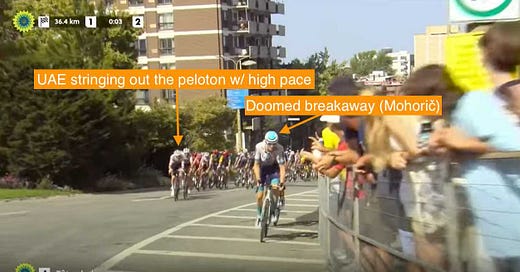



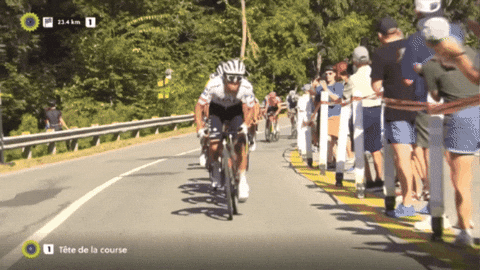
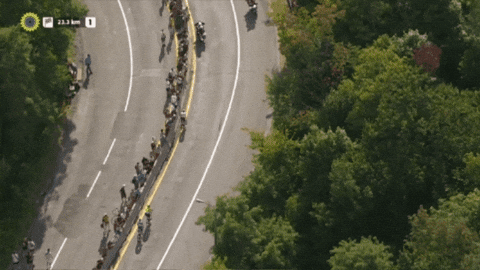

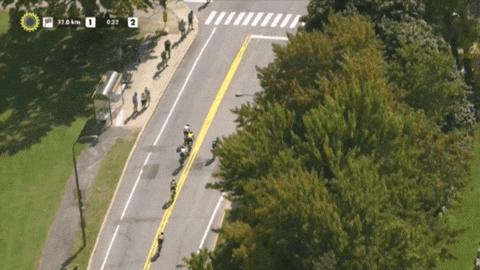
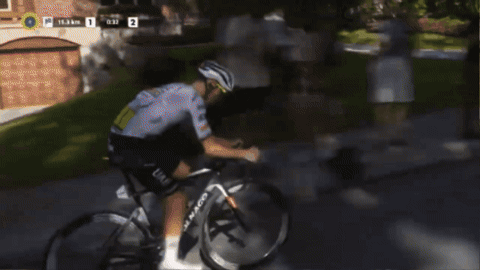
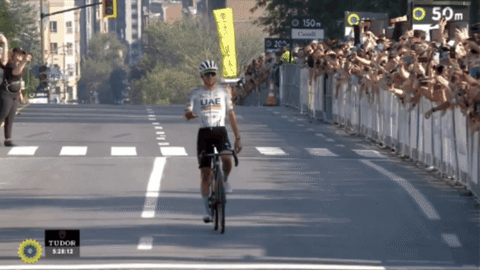
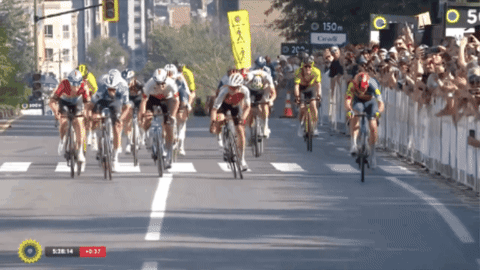
I have learned a lot from all your coverage this past Spring and Summer. It would be great if you could have a "mailbag" section at times to your column where you take and answer questions from readers regarding team/rider strategy, stages, etc. Thanks again.
Outstanding analysis. Go Pogie!